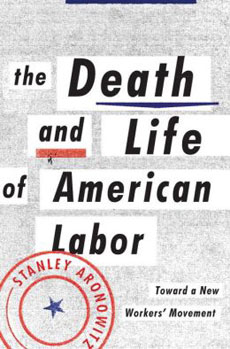Stanley Aronowitz has taught since 1983 at the Graduate Center of the City University of New York, where he is Distinguished Professor of Sociology and Urban Education, as well as Director of the Center for the Study of Culture, Technology, and Work. He is the author or editor of 25 books and founding editor of the journal Social Text.
Aronowitz, a labor activist, reflects on the sobering fact that union membership has fallen below 11 percent, the lowest rate since before the New Deal. Well over 90 percent of union contracts have a no-strike clause and the unions are required by law to enforce it. He writes: "We have entered a moment in history when the alternative to direct action seems starker than ever: Capitalism promises nothing and delivers misery for a large chunk of the populations of the planet. . . . the only way to challenge this repressive system is to take to the streets and occupy — and run — the key workplaces. "
The author claims that the age of real labor reform ended in 1938. Since that time workers have won "only a single major systemic victory: the enactment of Medicare and Medicaid in 1965." In addition, Progressives and the left have not cared enough about workers and unions to challenge the permanent war economy, the credit system, and the cultural causes underlying unemployment. Aronowitz laments the death of liberal reform and "the eclipse of the radical imagination." Another reason for the current impasse in labor is that most workers are hobbled with security anxiety. A final reason for the plight of unions is their failure to organize the new middle class.
Given the prospect that a jobless present and future may affect as much as 25 percent of the population by 2020, it is time for unions to aim high for shorter hours, a higher minimum wage, and guaranteed income. Aronowitz ends on a high and hopeful note with ten theses for a new labor movement.
